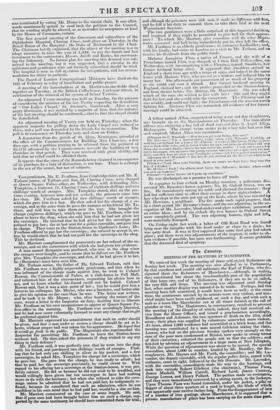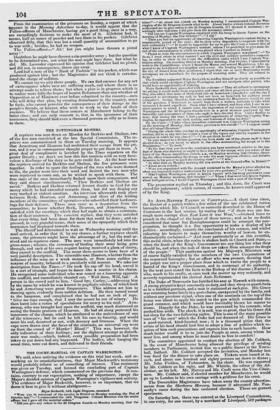be entuttrp.
MEETING OF THE HUNTITES AT MANCHESTER.
We noticed last week the meeting of these self-styled Reformers oxx Sunday last week. The meeting was also alluded to in Parliament, by that excellent and candid old nobleman the Earl of Eldon, who de- signated them the Reformers of Manchester,—although, in reality, they constituted but about the two-hundredth part of the populatiom of that large city, and of its Reformers, if they are to be so called, the very filth and dregs. The meeting was adjourned until Sunday last, when another display was intended to be made. Perhaps, had the meeting been left unnoticed, it would have been as well ; at the same time, the sentiments uttered by its orators were very violent, and mis- chief might have been easily produced, on such a day, and with such e mob as a town like Manchester can at all times furnish at the call of plunder or riot. The Magistrates, in consequence, resolved to prevent the meeting (of the illegality of which, indeed, they had received ad- vice from the Home Office), and issued a proclamation accordingly.. Broadhurst and Ashmore, the two spouters of froth on the 21st, staid_ away; their place was supplied by volunteers somewhat more violent.. At noon, about 1,000 workmen had assembled at a brick heap, and the meeting was constituted by a man named Gilchrist taking the chair. Lomax, who had on the previous Sunday spoken very strongly on the case of the poor men condemned at Bristol, now spoke in strong terms of their execution; exhorted the people not to fear the soldiers ; and finished by advising an adjournment to a large room at New Islington,. Whilethe question of adjournment was about to be moved, the special constables, about 1,000 in number, headed by Mr. Braidley, the Bo- roughreeve, Mr. Haynes and Mr. Forth, the constables ; and Mr. La- vender, the deputy constable, with the regular police force, armed with cutlasses, came in sight, followed by the 8th Hussars. Mr. Lavender, with the constables, immediately made his way to the hustings, and took into custody Robert Gilchrist (the chairman), Thomas Faux, James Maskell, William Carroll, Richard Lord, James Conway, George Lomax, and Henry Pollard. The parties made no resistance, and they were immediately conveyed, by a strong escort, to the lockups. Upon Thomas Faux was found concealed, under his jacket, a pike or dagger of about three quarters of a yard in length, the blade of whick was apparently near twelve inches long. From the disappearance of late of a number of iron gratings about Manchester, it is supposed that fa private manufacture of pikes has been carrying on for some time past. From the examination of the prisoners on Sunday, a report of which Itppears in the Morning Advertiser to-day, it would appear that the Police-officers of Manchester, having got a good thing, once in a way, are exceedingly desirous to make the most of it. Gilchrist had, it seems, half an ounce of powder and two flints in his pocket. Gilchrist observed drily, that this was but a small quantity of ammunition to go to war with ; besides, he had no weapon.
The Police-officer—" Ah ! but you might have thrown a pistol away !"
Doubtless he might have thrown a six-pounder away ; but the question to be determined was, not what the man might have done, but what be did. Mr. Lavender expressed his opinion that Gilchrist had no pistol, and did not, in consequence, throw any away.
Lord had a note of the " Bank of Fashion" in his pocket, which was produced against him ; but the Magistrates did not think it corrobo- rated the charge of sedition.
We cannot say we pity these people. We can find excuses for any act of extravagance where men are suffering much, and where there is no attempt made to relieve them ; but when a plan is in progress which is to realize more fully the hopes of honest Reformers than any whether of Opposition or of Ministers ever before submitted to the country—men who will delay that plan, by creating disturbance in the country, must be fools, who cannot perceive the consequences of their doings to the people's friends, or knaves, who wish to work to the hands of their enemies. We believe that these orators at Manchester belong to the latter class ; and our only concern is, that, in the ignorance of their townsmen, they should find even a thousand persons so silly as to listen to them.



























 Previous page
Previous page